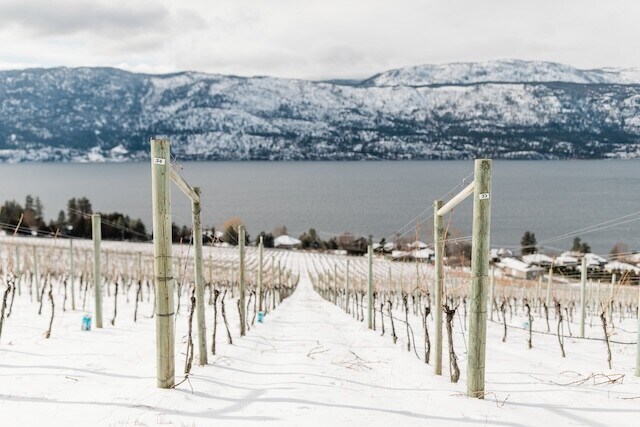The cold snap which broke multiple daily temperature records in the Okanagan over the weekend may have caused greater destruction to the wine industry than seen in years.
Ben-Min Chang, a scientist at the Summerland Research and Development Centre, said the vines at his location have all lost their buds, which means there won't be any grapes for this season.
He said the area hasn't seen an impact on the vines this bad since the 1990s, when the temperature dipped to -27 C.
"The temperature went down to -26 degrees C in Summerland," he said, referring to the past weekend.
"That temperature could cause devastating damage that not only destroys the buds and fruits, but also it may kill the whole vine, the trunk. So that's something I'm really worried about."
In late 2022, much of the weather impact came from a sudden drastic change in temperature as well, followed by a very hot 2023 summer. Harvest yields were far lower than normal for many vineyards.
The BC Wine Grape Council and Wine Growers British Columbia worked on the Winter Bud Damage Report this fall, which projected a crop loss of 54 per cent across the board from last year's climate-related setbacks.
Lindsay Kelm, the Acting Communications Director with Wine Growers British Columbia said over email that they have heard thus far, that the freeze event this past week had an even greater impact than last year unfortunately.
Chang said it will be a while before the area knows the true impact of this past week's arctic airmass.
"The temperature variation is super huge here, we have the influence of the lake and it really depends on the topography, and the wind direction," he added. "So for now, it's very hard to predict."
If the winery grows a cold-hearty varietal of grapes, Change said there's a chance that while they won't see any fruit this year, production could come back the following year, though at a much lighter yield.
"For a lot of growers, for example, in Salmon Arm or Kelowna, they're facing a decision [on whether to] replant the vine because the trunks are dead," he said.
"Most of the growers they have to face in the next year, there will be a very, very low yield or basically no yield."
Currently for most of the local wine grapes, which are European varietals, they can only tolerate to around - 24 C before they start to see devastating yield loss.
These temperatures are low enough that they could kill the wine grape flower buds before the next season.
When the temperature heads to - 27 C or lower, it can actually kill the whole vine.
Environment Canada reported that on Saturday, Penticton broke its daily minimum record, with a low of -27.6 C, while Osoyoos saw a low of -22.3 C.
To the north of the valley, Salmon Arm set a new record of -30.4 C. And while Kelowna didn't break any daily temperature records, they still hit a low of -30 C, recorded at Kelowna International Airport.
Chang expects many growers will be looking at crop insurance to cover their losses.
He previously said that the mechanics of these freezing events is still kind of mystery in the biology world, but he is working on a guide for cold damage assessment to help growers.
It will be a couple of weeks before a clearer picture forms of how widespread the damage is, as growers inspect their buds to see if they survived. Whether the entire vine and trunk was killed by the cold won't know for a while.



